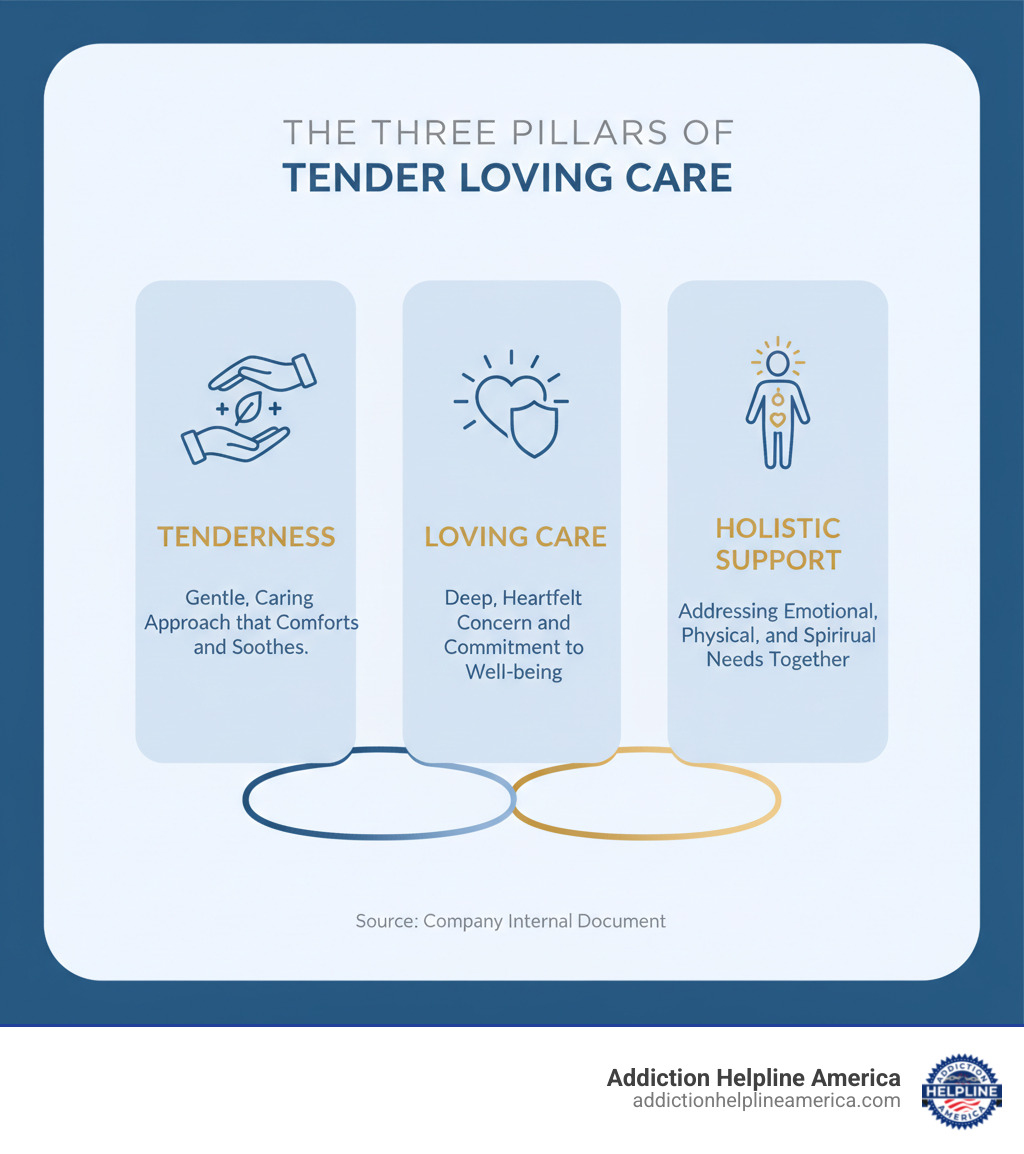
Understanding the Heart of Compassionate Care
Tender loving care (TLC) is the compassionate, attentive, and nurturing support given to someone or something to promote well-being and healing. It’s more than a simple phrase; it’s a fundamental approach to connection that combines gentleness, empathy, and consistent support. At its core, TLC involves:
- Compassion and empathy
- Nurturing attention
- Holistic support (emotional, physical, and spiritual)
- Patience and reliability
Merriam-Webster defines it as “extra attention to make someone or something look or feel better.” This captures the essence of TLC: going beyond basic care to provide the attentive support that truly makes a difference. Research even shows that individuals receiving regular acts of kindness report up to 30% higher levels of happiness and significant stress reduction.
At Addiction Helpline America, we see how TLC forms the cornerstone of effective addiction recovery. Our team provides compassionate, confidential guidance rooted in these principles, connecting people with the resources they need to heal. We know recovery demands more than treatment—it requires the nurturing, patient support that helps people rebuild their lives with dignity and hope.
The Core Elements and Benefits of Tender Loving Care
Tender loving care is a mindset rooted in genuine concern for another’s well-being. It’s the difference between simply performing a task and infusing it with love and attention. This approach is built on several key elements:
- Compassion and Empathy: Actively wanting to ease someone’s pain by stepping into their shoes and understanding their feelings.
- Nurturing and Patience: Providing consistent, gentle support that allows people to heal and grow at their own pace, without expecting immediate results.
- Holistic Support: Recognizing that people are whole beings and addressing their interconnected physical, emotional, and spiritual needs.
- Consistency and Reliability: Showing up dependably, which builds the trust and safety necessary for healing.
When woven together, these elements have profound psychological benefits. Being cared for and caring for others measurably improves mental and emotional health. Stress levels drop as the nervous system calms in a supportive environment. This leads to an improved mood and creates a buffer against loneliness, depression, and anxiety. Studies show that individuals who regularly experience kindness report up to 30% higher levels of happiness.
This compassionate care becomes the very foundation for healing and growth, especially when facing illness, loss, or addiction. It helps build resilience for future challenges and provides the stability needed to overcome adversity. For those on their First Steps to Recovery, TLC creates a safe space where vulnerability is possible and deep emotional wounds can begin to heal.
At Addiction Helpline America, we know that combining professional treatment with this kind of compassionate human connection is where real, lasting healing happens. Here are some simple ways to bring TLC into your daily life:
- Practice active listening without judgment.
- Offer genuine, specific compliments.
- Schedule dedicated, distraction-free time for loved ones.
- Set healthy boundaries to protect your own well-being, allowing you to better care for others.
The Many Faces of TLC: From People to Possessions
Tender loving care isn’t limited to one context; it appears everywhere in our lives. The core idea of giving “extra attention to make someone or something look or feel better” applies to people, pets, and even possessions.
- In Relationships: TLC is comforting a child, holding a partner’s hand, or patiently helping an aging parent. It’s the emotional and physical support custom to a loved one’s needs.
- In Communities: It’s volunteers at a food bank or neighbors organizing a meal train. These acts of community support create connection and foster our shared humanity.
- With Animals and Objects: TLC is the patience shown to a rescue animal learning to trust, or the meticulous attention given to restoring a family heirloom. It’s about nurturing, protecting, and improving well-being in any form.
Professional Tender Loving Care in Healthcare and Recovery
In healthcare, TLC is a powerful force that weaves human compassion into medical treatment. For someone facing addiction or mental health challenges, it’s foundational to recovery. This approach, known as patient-centered care, puts a person’s unique needs and values at the center of every decision.
At Addiction Helpline America, we know recovery is deeply personal. Our network emphasizes individualized care plans that address each person’s emotional, physical, and spiritual needs. Whether someone needs guidance from our Mental Health Helpline Complete Guide or is seeking specialized treatment, the foundation is always understanding and genuine care. Empathy in communication—truly listening and validating feelings without judgment—builds the trust needed for people to take an active role in their own healing. For more on the concept, you can explore the definition of tender loving care.
TLC in Relationships and Self-Care
Beyond professional settings, TLC is vital in our personal lives and in how we treat ourselves. In parenting and elder care, it means creating a stable, nurturing environment where loved ones feel safe, heard, and valued. In romantic partnerships, it’s the small, consistent gestures and the willingness to Communicate Openly that nurture the connection.
Crucially, you must offer tender loving care to yourself. Self-care isn’t selfish; it’s necessary. It includes self-compassion, getting enough rest, and making time for joy. One of the most important forms of self-care is setting boundaries. This is especially true when a loved one is struggling with addiction. You can care deeply about someone while still protecting your own well-being. Taking care of yourself makes you more effective at helping others, as you model what balanced, healthy living looks like.
The Transformative Impact of Giving and Receiving Care
Tender loving care is a powerful force that transforms lives. When we receive it, we feel seen, valued, and less alone, giving us the strength to face challenges. The act of giving TLC is just as transformative, boosting our own happiness and sense of purpose. It’s a win-win that taps into our fundamental human need for connection.
The social impact of TLC ripples outward, strengthening communities by fostering empathy and support. This is visible in the work of volunteers, community members joining local organizations, and neighbors sharing resources at community events. This collective spirit is vital for someone overcoming addiction. A supportive community that provides consistent, non-judgmental care creates a safety net that makes recovery possible and helps Relapse Prevention Tips work in the real world.
At Addiction Helpline America, we know recovery doesn’t happen in isolation. It happens through connection, support, and tender loving care.
Cultural and Personal Nuances of TLC
The phrase tender loving care is so universal it has appeared in music, film, and even video games, from the iconic R&B group TLC to a psychological thriller film and game of the same name. This shows how deeply the concept resonates.
However, while the core elements of TLC are universal, their expression varies across cultures and individuals. What feels supportive to one person might feel intrusive to another. This is why a holistic and individualized approach is essential, especially in a Treatment Options Dual Diagnosis Treatment Facility. True TLC requires sensitivity and a willingness to meet people where they are, addressing their unique emotional, physical, and spiritual needs. At Addiction Helpline America, this personalized approach guides everything we do, ensuring everyone who reaches out finds care that feels right for them.
Frequently Asked Questions about Tender Loving Care
Here are answers to some common questions about tender loving care.
What is the difference between simple care and ‘tender loving care’?
Simple care covers the basics—the functional tasks needed for well-being. Tender loving care is about how you perform those tasks. As Merriam-Webster notes, it’s the “extra attention to make someone or something look or feel better.” It’s the warmth, patience, and emotional depth you bring to the act of caring. TLC transforms routine tasks into meaningful acts of compassion.
How can I practice TLC for someone struggling with addiction without enabling them?
This is a critical and difficult balance. True tender loving care for someone with an addiction means empowering their recovery, not enabling the disease. This involves:
- Setting firm boundaries. You can love the person without supporting their addiction. For example, refuse to provide money for substances but offer to drive them to a support meeting.
- Encouraging professional help. The most loving act is to connect them with treatment. Addiction Helpline America offers free, confidential guidance to find the right program.
- Practicing self-care. You cannot pour from an empty cup. Prioritize your own well-being so you can offer genuine, sustainable support.
Loving someone unconditionally doesn’t mean unconditionally supporting their harmful behaviors. It means loving them enough to support their journey toward health.
Can you give TLC to non-living things?
Yes, absolutely. The concept extends to objects, places, and projects. It’s about investing devoted attention and care to preserve or improve something you value. Think of a gardener carefully tending to a struggling plant, an enthusiast carefully restoring a vintage car, or a conservator painstakingly repairing an old painting. In each case, the approach goes beyond basic maintenance to become an act of tender loving care.
Conclusion: Embracing the Power of Compassionate Care
Tender loving care is more than a kind gesture; it’s a fundamental approach to life that builds connection, fosters healing, and improves well-being. From its core elements of compassion and empathy to its role as a foundation for recovery, TLC is the gentle, consistent presence that reminds us we are not alone.
We’ve seen that its benefits are real and measurable—reducing stress, strengthening relationships, and promoting growth. This is especially true for those facing addiction or mental health challenges, where professional treatment combined with genuine compassion creates the environment for lasting change.
At Addiction Helpline America, our mission is built on these principles. We provide free, confidential support to guide you toward treatment centers that accept the spirit of tender loving care. We connect people with facilities that see the whole person and provide the nurturing environment essential for recovery.
If you or a loved one is struggling, help is available. The journey to healing begins with one step, and you don’t have to take it alone. Let us offer the compassionate guidance you deserve.
Find the right drug and alcohol rehab center with our complete guide
Our helpline is 100%
free & confidential
If you or someone you care about is struggling with drug or alcohol addiction, we can help you explore your recovery options. Don’t face this challenge alone—seek support from us.
Programs
Resources
Will my insurance
cover addiction
treatment?
We're ready to help
Find the best
drug or alcohol treatment
center
Are you or a loved one struggling with addiction? Call today to speak to a treatment expert.
















